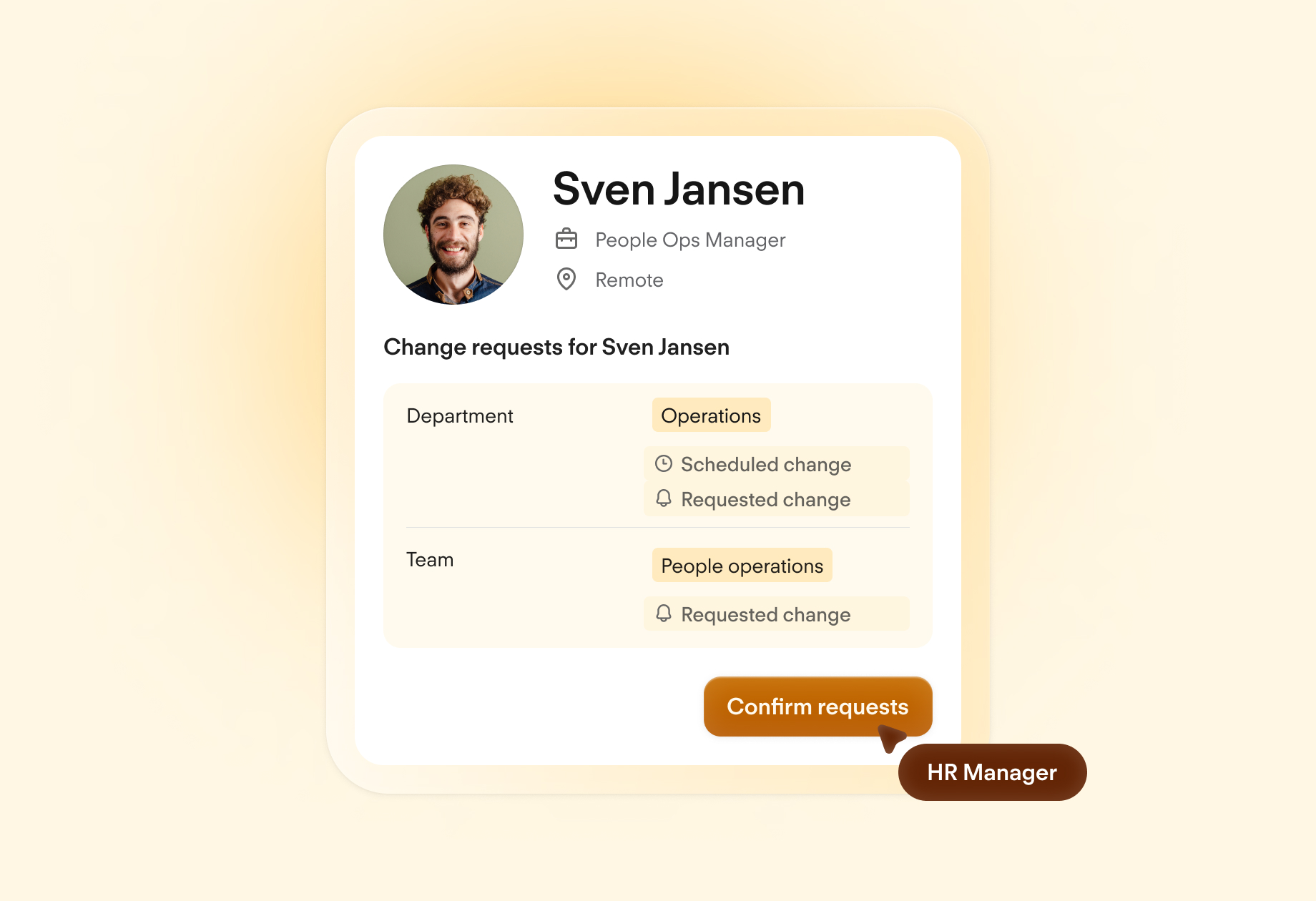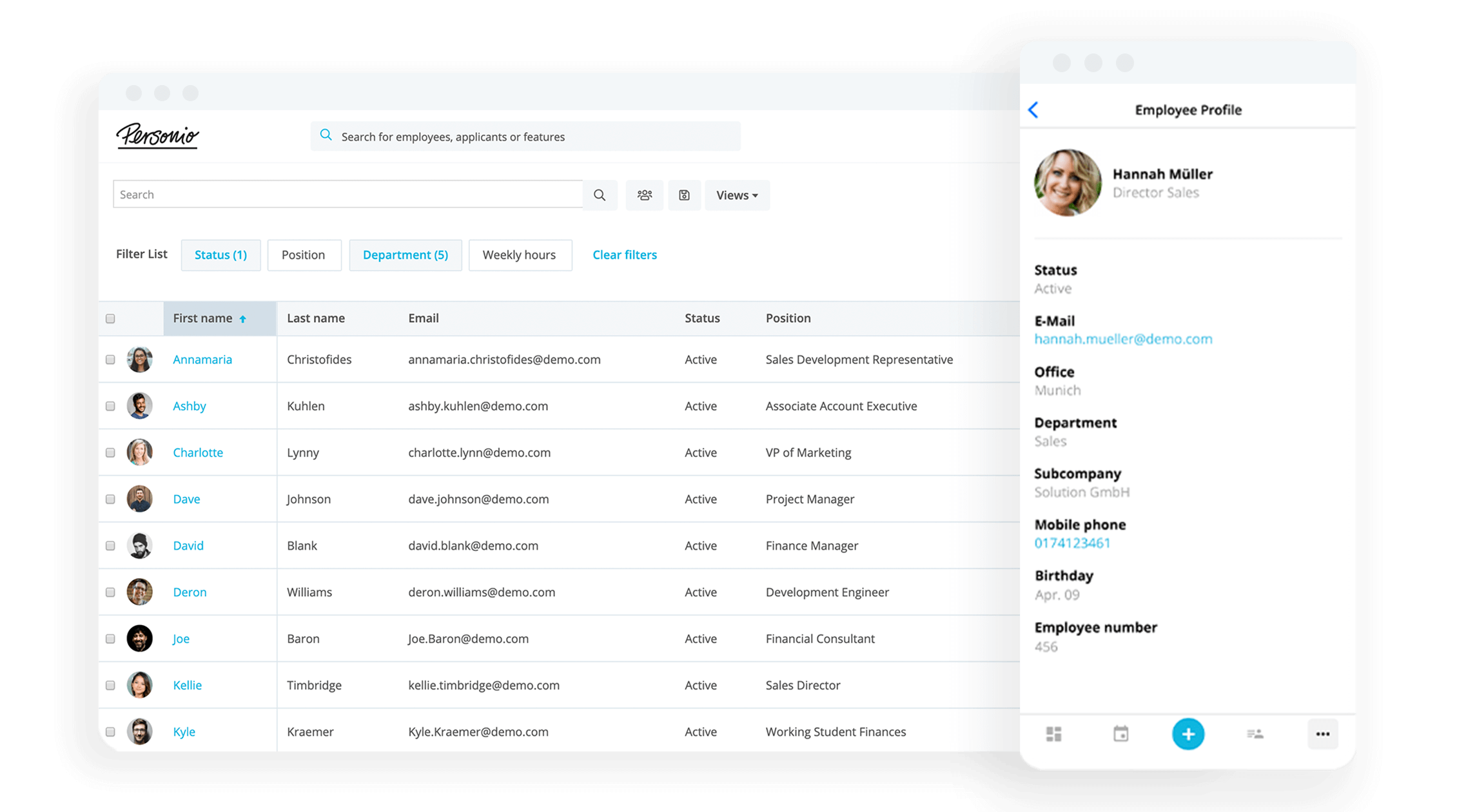The Complete Guide to Crucial HR Policies
If growth is in the offing, it’s imperative that leaders set their organization up for success with a solid HR foundation. HR policies exist not only to impose rules but to create fairness and help people confidently navigate their work-life.
Avoid growing pains and keep things running smoothly with these 8 essential HR policies in place...
Need somewhere to store contracts? Learn about Personio’s digital employee file today.What Are HR Policies?
HR policies are policies that help govern organisational behaviour from top to bottom. They typically set standards for behaviour, while communicating unacceptable breaches of policies that may feature employment-based consequences/.
1. Travel & Entertainment
From travel costs to entertainment expenses to dining out as a team, it’s crucial to have HR policies that lay out expectations for employees. These policies are there to ensure everyone feels comfortable making reasonable requests that are within your company’s budget.
Additionally, HR leaders can create policies in this area that directly impact your company’s carbon emissions. For instance, you can encourage choosing trains over planes for business travel.
Without it: Potentially high expenses for the company and conflict between employees.
2. Work Setup
This has become even more relevant in the Covid-19 era. What are your company policies on work setup – from work equipment to office space to work-from-home rules – and how do they apply to employees?
Deciding these HR policies ahead of time ensures everyone at the company feels
Comfortable making requests
That the system is fair across the board
Without it: Uneven treatment of employees, confusion on what’s allowed and uncertainty about what equipment is available.
3. Anti-Discrimination
Regardless of whether it’s required by law in your region, it’s important to define which behaviour is unacceptable, how employees and witnesses should report cases and get support, and how the organization deals with cases of misconduct.
AIHR lists several reasons why a non-discrimination policy is necessary:
Employer brand – Candidates want to work for a business that treats everyone fairly. A non-discrimination HR policy helps you clearly state the company’s values
Compliance – “At a minimum, your non-discrimination policy needs to comply with all country and local laws.” Of course, your organisation can also provide even stronger protections for employees than those required by law.
Clarity on employee behaviour – A clearly written company policy lets managers and employees know what is and is not acceptable within the organisation. If someone misbehaves, “it’s far easier to point to a policy than refer to a law the employee may or may not have ever heard of.”
Fighting bias – Everyone in the organisation – from managers to employees – has their own individual biases. A clear policy (that is consistently enforced) can help people limit the impact of those biases in the workplace.
Without it: A culture where victims of discrimination and harassment are afraid to speak up or don’t know where to go for support.
4. Benefits
In today’s competitive job market, ensuring your employees all understand the full scope of the perks and benefits offered will drastically improve retention.
Beyond this, it’s crucial that the whole team knows who is eligible for which benefits. Examples of restrictions could include:
Full-time vs. part-time
Only permanent employees
On-site vs. those working from home
Only after X months on the job
Without it: Employees may leave for a job that appears to be more attractive without actually understanding most of your organisation’s benefits.
5. IT Security & Privacy
Of course, IT and data protection experts should be responsible for the company policy’s actual content. However, the HR team owns onboarding and knows best how to address the workforce. Security policies help ensure every new employee follows the same guidelines to protect the sensitive information of your company, customers, and team.
The Society for Human Resource Management, or SHRM, has been touting the importance of privacy in HR for decades.
According to them, HR managers from companies with mature privacy programs emphasize that “creating privacy policies represents only one of several components necessary for effective privacy management. They say managing the policies requires board-level action, an ongoing collaborative management effort, employee education and, just as important, making the policies meaningful to all employees.”
Without it: The organisation opens itself up to enormous risk: data breaches, sensitive data in the hands of competitors, or even lawsuits from damaged parties.
6. Health & Wellbeing
This must-have HR policy is especially important during challenging times – like a pandemic. As teams were forced to grapple with working during Covid-19, conversations around mental and physical health grew louder.
Does your organisation have clearly written policies on sick time? Personal days? Where employees should turn if they need support for their own wellbeing? If not, there’s never been a better time to lay out these policies and empower your employees.
Without it: Unproductive employees and elevated rates of burnout. In time, these lead to higher turnover and higher costs.
7. Hiring
Whether you’re seeking candidates internally or looking outside the organization, clearly-written hiring policies will save everyone headaches – and even potential lawsuits.
These essential HR policies should cover the end-to-end hiring process, from initial job posting through contract signing and onboarding. As we all know, hiring the wrong person is always a nightmare, so ensure there are procedures in place for reviewing candidate experience.
Without it: A host of long-term issues. Inconsistent processes, poor candidate experience and damage to the company’s reputation. Moreover, there may be violations of fair hiring laws if managers discriminate against potential candidates based on race, religion, sex, etc.
8. Performance & Feedback
These policies should clarify how individual performance is measured, how to give and receive feedback (e.g., formal at a performance review vs. informal at weekly one-on-one meetings), and how underperformance is dealt with.
Without it: Team members could perceive inconsistent standards or unfair treatment within the organization. Employees could have negative reactions to feedback or bring lawsuits against the company. Plus, underperformers could drag down the overall team spirit (company culture) and the performance of others.
How To Communicate HR Policies
Clear company policies should be a top priority for any HR team.
A 2018 Small Business Compliance Survey from Comply found that even though 84% of businesses offered formalized written policies and employee handbooks – and 85% required employees to acknowledge receipt of their policies – there were still some essential HR policies that were not communicated clearly in the workplace.

